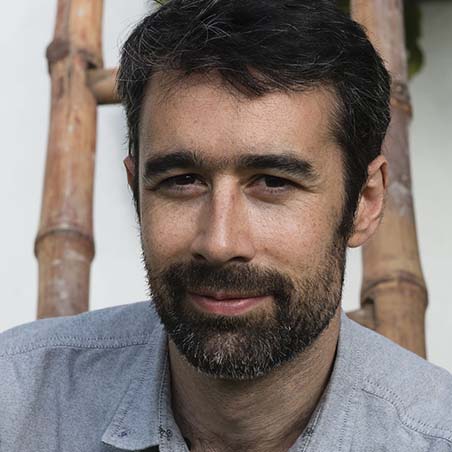Ariel Nasr
Filmmaker
Bachelor of Arts (Hons.), History of Science and Technology and Classics, 2005
Documentary is wonderful because you can follow this story unfolding in front of you.
It’s hard to imagine how a bout of tendonitis could lead to an Oscar nomination, a place in the FIN Atlantic International Film Festival Gala, and a great gig with the National Film Board (phew!), but it did for Ariel Nasr.
This part of his story begins with Ariel cutting wood.
“I suffered a repetitive strain injury using a chainsaw that turned into chronic tendonitis,” Ariel told an interviewer from Schema Magazine. “Since I couldn’t continue with farm work until it healed, I decided to spend a year at university”. Once he started reading the classics, Ariel had no desire to stop.
The Foundation Year Program (FYP) can have that effect on people, and it certainly did on Ariel. After his first year he majored in History of Science and Technology (HOST) and Classics.
“I remember going from this one perspective to the other and just loving the contrast between the two things,” he says. And that, he would find out, is at the core of making documentaries.
“You see one perspective, one reality, and you say ‘Yes’. Then you go to another one and you say ‘Yes, and…Yes, and..’ Documentary is wonderful because you can follow this story unfolding in front of you.”
Ariel began his filmmaking career in his final year at King’s—a documentary about that most pressing student issue, rising tuition fees. More filmmaking would follow and the content would shift dramatically. Soon after graduating Ariel travelled to Afghanistan, his father’s homeland. What he discovered there, with his burgeoning interest in documentary films, was “the nuance and complexity of this place that is full of millions of stories.”
That is obvious when you look at the work Ariel produced. His film credits include writer and director of Good Morning Kandahar and The Boxing Girls of Kabul, documentaries for the National Film Board (NFB). Ariel switched from documentary to fiction when he produced the short film Buzkashi Boys. It’s a coming of age story of two young Afghan boys, set in Kabul. That earned him a nomination for an Academy Award for the Best Live Action Short Film in 2013.
“Getting nominated for an Oscar, there’s no better way to make the point that Afghanistan has filmmaking talents that go way beyond (films about) war,” he told the Toronto Star.
Afghan filmmaking takes centre stage in his latest documentary, The Forbidden Reel. It examines the recent history of the country through the lens of films rescued from almost certain destruction at the hands of a radical branch of the Taliban. That is the film that earned Ariel a place in the 2020 FIN gala. It has also been part of festivals across the country and internationally.
Ariel’s next adventure will take place right here in Canada, where, for the next fifteen months, he’ll be the Interim English producer in Quebec for the NFB.
It’s a long way from cutting wood and a bout of tendonitis, but it would be hard to imagine that this is in any way the end of Ariel’s journey. For now though, it’s pretty cool.
“The NFB has always been an institution that cares about making art with purpose,” Ariel says. “That’s what excites me most”.
Update: Oct. 2020
 Connect with Ariel Nasr
Connect with Ariel Nasr